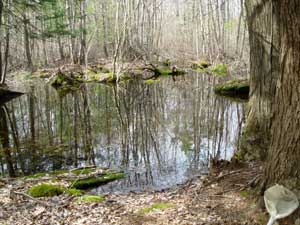Soon you will be able to hear a chorus of peeping Spring Peepers and quacking Wood Frogs. The noise makes it easier to locate the vernal pools where they hang out. Vernal pools are isolated wetlands that hold water on a temporary basis. They might be as small as a living room or as big as a football field. They can occur deep in the forest, in open wetlands, or in low spots on land. They are filled by the spring's rising water table or melting snow, and dry up by late summer.
 |
This vernal pool in the Fifty-Acre Wood in Woodstock is protected forever, thanks to a donation of land by the Darbee family. Others are rapidly disappearing as a result of development. |
“The first few warm, rainy nights of spring will bring a parade of salamanders, risking exposure to predators and traffic as they make their way to pools to breed,” notes Cheryl Dziura-Duke of the Woodstock Conservation Commission. Vernal pools are very important to the life cycle of many amphibians, as they are too shallow and short-lived to support fish that would eat the amphibian eggs or larvae.
Other species that depend on vernal pools for successful breeding include fairy shrimp (inch-long crustaceans with a lifespan of just a few weeks), and rare creatures like Blue-spotted and Jefferson salamanders and Eastern Spadefoot toads. A wide variety of other forest animals use vernal pools for feeding and resting. In addition, these "sylvan gems" are aesthetically pleasing, with moss-covered logs, delicate hues of green and brown, and dappled sunlight shining through forest cover.
However, because they are small, hard to identify, and subject to limited regulation, they are often impacted by development. As a result, vernal pools - and the species that depend on them - are rapidly disappearing. That is why the Town of Woodstock is joining Pomfret in conducting a vernal pool inventory. The information collected can then be used by local agencies when making land use decisions.
The Woodstock Conservation Commission in CT recently received a $1,265 grant from the New England Grassroots Environment Fund to train volunteers and purchase equipment to conduct the inventory. Paula Coughlin, Citizen Scientist Coordinator for the Connecticut Audubon Society (CAS), will provide the training. Cheryl Dziura-Duke and Medora Fraga will be coordinating volunteer efforts. Anyone can join in the fun. Woodstock residents can participate in the training for free (others pay a small fee for the training to help cover costs.)
Some activities, like reporting quacking frogs or known pool locations, do not require any training. Trained volunteers can document vernal pools once they are found. Or, like Cheryl and Medora, who are experienced Connecticut Audubon Society Citizen Scientists, you can learn how your town can begin its own vernal pool inventory.
Because vernal pools are small and temporary, “ says Dziura-Duke, “they don't show up on town or topographic maps. Increased public awareness is key to minimizing their loss.” Vernal pools are critical habitats that we must work together to protect. Mechanisms include acquisition by a conservation organization like a land trust; conservation easements; employment of best management practices to integrate design, engineering and natural resource protection into developments; zoning/ordinances; and last but not least, voluntary stewardship programs by landowners like you. |
TRAINING: If you missed the introductory sessions held on March 19 and 27th, you can still attend the three hour training at the CT Audubon Society Center at 189 Route 169 in Pomfret, CT on Saturday, April 5 or April 12, or Friday, April 11, from 9:00 a.m. to noon. Woodstock residents fee covered by NEGF grant; CAS members $7, Non-members: $15. Volunteers can then collect data on their own time or visit vernal pools with a project coordinator during April and May. The more trained Citizen Scientist volunteers we have, the more pools we can identify!
Please call to register for the training or to report the location of a vernal pool in Woodstock, CT: 860.928.4948 |

